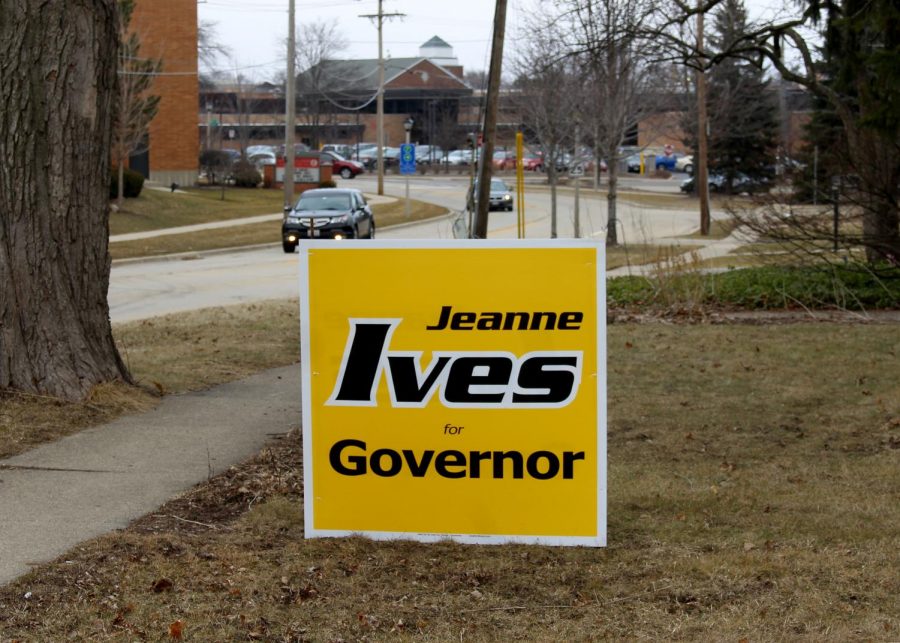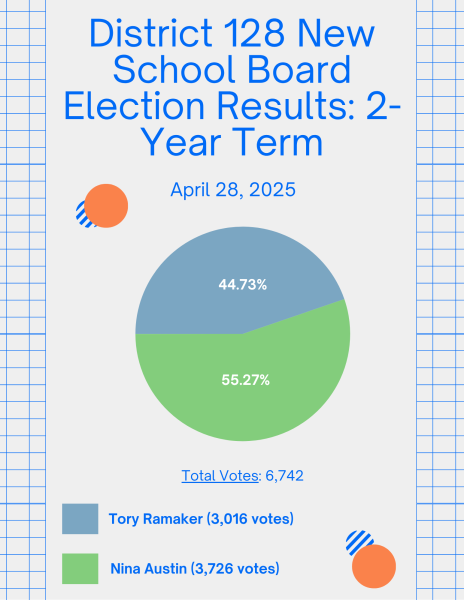LHS students to serve as election judges for primaries
One of the larger election signs in Libertyville is in support of Jeanne Ives, a Republican candidate for governor, which is located off of Brainerd Avenue, not too far from LHS.
On Tuesday, March 20, more than 20 LHS students will serve as election judges at the Illinois primary election polls.
They will work at various locations starting at 5:45 a.m. until about 8:30 p.m. The primary polls are open from 6:00 a.m. to 7:00 p.m. for all voters.
According to the Lake County website, the election judges “are responsible for the proper and lawful conduct of all elections by serving in local voting sites.”
The students completed their training to receive certification on Feb. 13 either at LHS or another sponsored location. The course lasted approximately two and a half hours and included presentations, practice time and an assessment at the end. The goal was to not only train the future election judges for their roles and teach the election rules but also to incorporate situational preparedness for whatever may happen at the polls.
This opportunity was promoted to students primarily by the Social Studies Department. Mr. Shawn McCusker, the LHS Social Studies Department Supervisor, emphasized the priority the department has to encourage students to get involved in their government.
“The best predictor of engagement in voting and being politically active is previous commitment. Once you’re involved, just stay involved,” he said. “The more people you get involved at some type of level early on, the more likely they are going to be more aware.”
After hearing about the position in her government class, LHS senior Nicole Haderlein wanted to gain a behind-the-scenes look at the voting process.
“I wanted to get involved in the election process. It’s the first time that I’ve ever done anything like this. So, I wanted to see how it works inside the election,” Haderlein said.
As a first-time election judge, Haderlein is looking forward to becoming a part of her government process while also making some money. She will only be participating in the March primaries as she will be attending school out of state during the general election in November.
Mr. McCusker explained that of the four years he has been at LHS, this year had the largest amount of student participation.
“We had initially 70 people who were interested, and then we had about 50 who filled out the forms and turned them in. Then because they’re trying to figure out dates and times, we had about 20-25 who came to our training or went to other locations for training,” said Mr. McCusker.
On the day of the primaries, there are two different types of roles that the election judges will be assigned. The first position is being part of the check-in table, where the identity of the voter gets verified through the use of an electronic pollbook — a database that includes every name in the county. The second role requires the election judge to distribute the ballots to the voters, issuing the correct ballot based on the voter’s political party.
All election judges will receive a base payment amount of $140. McCusker discussed how “there are additional bonuses that you could get if you perform certain roles [such as] if you travel outside of your township, they pay a little bit more.” One could also receive more money if they completed extra training to achieve a higher role on the day of the elections.
Junior Matt Chyna is another LHS student fulfilling the election judge role on March 20. Besides hearing about the opportunity in his Honors United States History class, Chyna is also following in his mom’s footsteps.
“I became interested in becoming an election judge because my mom had always been a judge for every election, and I thought that it would be an interesting opportunity to try out,” Chyna said in an email interview.
Chyna explained that he hopes to walk away from this experience with a better understanding and new perspective on how the United States voting system works.





![Mr. Abullh Ali, manager/assistant, helps open Queen Yemeni Coffee in downtown Libertyville at 606 North Milwaukee Ave. With the help of employees such as manager and LHS senior Yousef Taha, they are able to bring the Yemeni and Ethiopian culture to Libertyville by using their Queen spices, cinnamon and cardamom in their drinks such as Adani Chai, which is inspired by Sheda, the Queen of Yemen and Ethiopia. “The history of our coffee [is] a long history and we believe that Yemen and Ethiopia started the coffee and we are bringing something unique to the community,” Mr. Ali said.](https://www.lhsdoi.com/wp-content/uploads/2025/04/Photo-1-600x400.jpg)



